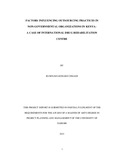| dc.description.abstract | This study was on the Factors Influencing Outsourcing Practices in NGOs in Kenya:
A Case of International Drug Rehabilitation Centre (IDREC). Of late, NGOs have
adopted outsourcing as a strategy to reduce internal financial wastage, cutting costs
and being responsive to donor requirements, enabling the NGOs concentrate on the
mission for which they were set. Outsourcing entails shifting of traditional corporate
activities to parties outside of the firm with the aim of gaining access to world class
capabilities. Under the relentless pressure to compete, companies globally are striving
to increase the quality of their goods and services and at the same time reduce costs.
This study focused on five major objectives. First it tried to identify the factors
influencing outsourcing practices in the NGO industry. Secondly, it sought to
establish the strategies adopted to cope with the challenges of outsourcing and thirdly,
it sought to determine the impact of outsourcing on the level of customer service. This
study was being conducted through a survey to establish the responses. Data was
collected from primary sources through personal interviews and questionnaires from
respondents who are employees at International Drug Rehabilitation Centre. The data
obtained was then analysed and interpreted using content analysis technique. The
study identified a number challenges that International Drug Rehabilitation Centre has
faced as a result of outsourcing its services, including poor communication, loss of
control, quality of service, lack of performance measures, and skill level of the 3PL
personnel. The research established that International Drug Rehabilitation Centre has
come up with a number of strategies to deal with the challenges. This included
implementing key performance measures, improving communication channels and
modes, regular operational meetings and intensive training of the 3PL employees. The
research results also indicated that outsourcing had significantly led to improvement
in customer service. The study recommends that International Drug Rehabilitation
Centre needs to improve on its relationship management to make the organization
enjoy the full benefits of outsourcing. It also recommends benchmarking with the
industry, engaging a dedicated manager to manage the third party and closely
monitors the Key Performance Indicators (KPIs). This study assessed the influence of
resource utilization, quality of service delivery, stakeholder satisfaction, strategies
adopted, and corporate efficiency on outsourcing decisions at International Drug
Rehabilitation Centre and found out that they have a significant influence on its
operations. There is need therefore for regular and honest reviews, challenging the
3PL to be the new leader in innovation and greatercapacity building between the two
partners to work together towards the same goal. | en |

